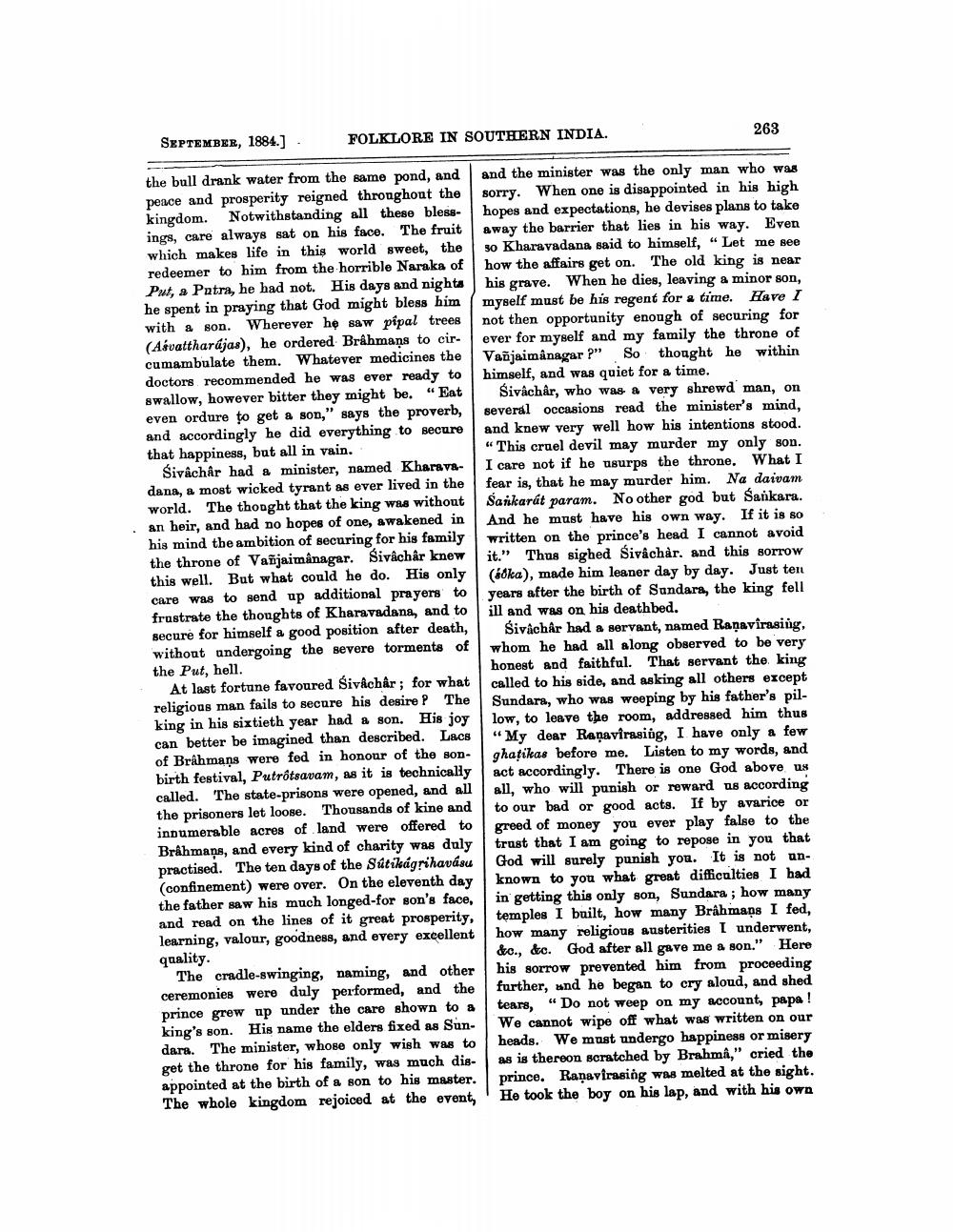________________
SEPTEMBER, 1884.]
FOLKLORE IN SOUTHERN INDIA.
263
the bull drank water from the same pond, and peace and prosperity reigned throughout the kingdom. Notwithstanding all these blessings, care always sat on his face. The fruit which makes life in this world sweet, the redeemer to him from the horrible Naraka of Put, a Patra, he had not. His days and nights he spent in praying that God might bless him with a son. Wherever he saw pípal trees (Asvattharajas), he ordered Brahmans to cir. cumambulate them. Whatever medicines the doctors recommended he was ever ready to swallow, however bitter they might be. "Eat even ordure to get & son," says the proverb, and accordingly he did everything to secure that happiness, but all in vain.
Sivâchår had a minister, named Kharava- dana, a most wicked tyrant as ever lived in the world. The thought that the king was without an heir, and had no hopes of one, awakened in his mind the ambition of securing for his family the throne of Vañjaimanagar. Sivachår knew this well. But what could he do. His only care was to send up additional prayers to frustrate the thoughts of Kharavadana, and to secure for himself a good position after death, withont undergoing the severe torments of the Put, hell.
At last fortune favoured Sivachâr; for what religious man fails to secure his desire P The king in his sixtieth year had a son. His joy can better be imagined than described. Lacs of Brahmans were fed in honour of the sonbirth festival, Putrôtsavam, as it is technically called. The state-prisons were opened, and all the prisoners let loose. Thousands of kine and
numerable acres of land were offered to Brahmans, and every kind of charity was duly practised. The ten days of the Sútilágrihavásu (confinement) were over. On the eleventh day the father saw his much longed-for son's face, and read on the lines of it great prosperity, learning, valour, goodness, and every excellent quality.
The cradle-swinging, naming, and other ceremonies were duly performed, and the prince grew up under the care shown to a king's son. His name the elders fixed as Sundara. The minister, whose only wish was to get the throne for his family, was much disappointed at the birth of a son to his master The whole kingdom rejoiced at the event,
and the minister was the only man who was sorry. When one is disappointed in his high hopes and expectations, he devises plans to take away the barrier that lies in his way. Even so Kharavadana said to himself, “Let me see how the affairs get on. The old king is near his grave. When he dies, leaving a minor son, myself must be his regent for a time. Have I not then opportunity enough of securing for ever for myself and my family the throne of Vañjaimanagar P" So thought he within himself, and was quiet for a time.
Sivachår, who was a very shrewd man, on several occasions read the minister's mind, and knew very well how his intentions stood. “This cruel devil may murder my only son. I care not if he usurps the throne. What I fear is, that he may murder him. Na daivam Sarkarát param. No other god but Sankara. And he must have his own way. If it is so written on the prince's head I cannot avoid it.” Thus sighed Śivâchår. and this sorrow (ska), made him leaner day by day. Just ten years after the birth of Sandara, the king fell ill and was on his deathbed.
Sivâchår had a servant, named Ranavirasing, whom he had all along observed to be very honest and faithful. That servant the king called to his side, and asking all others except Sundara, who was weeping by his father's pillow, to leave the room, addressed him thus “My dear Raņavirasing, I have only a few ghatikas before me. Listen to my words, and act accordingly. There is one God above us all, who will punish or reward us according to our bad or good acts. If by avarice or greed of money you ever play false to the trust that I am going to repose in you that God will surely punish you. It is not anknown to you what great difficulties I had in getting this only son, Sundara ; how many temples I built, how many Brahmans I fed, how many religious austerities I underwent, &c., &c. God after all gave me a son." Here his sorrow prevented him from proceeding further, and he began to cry aloud, and shed tears, "Do not weep on my account, papa! We cannot wipe off what was written on our heads. We must undergo happiness or misery as is thereon scratched by Brahmi," cried the prince, Ranavirasing was melted at the sight. He took the boy on his lap, and with his own




